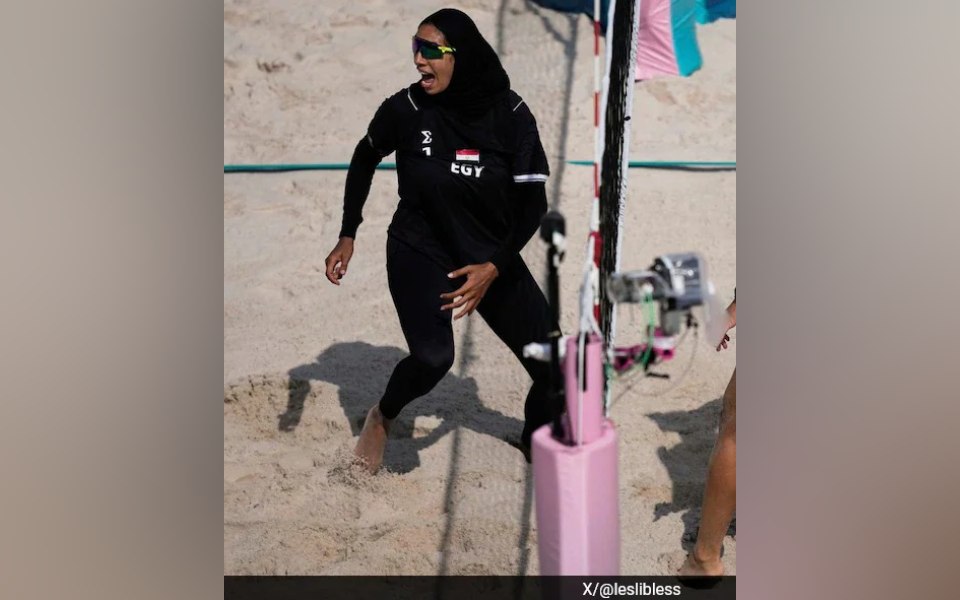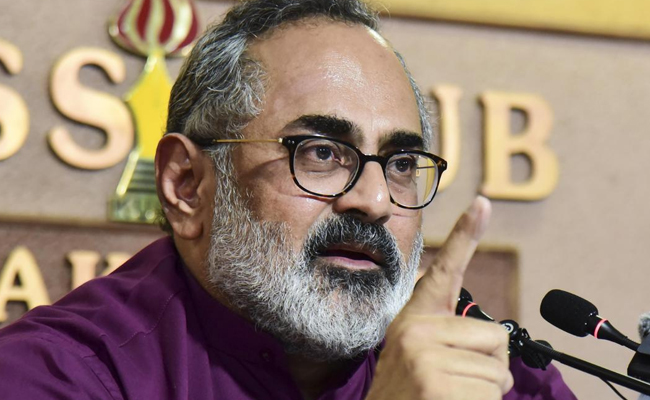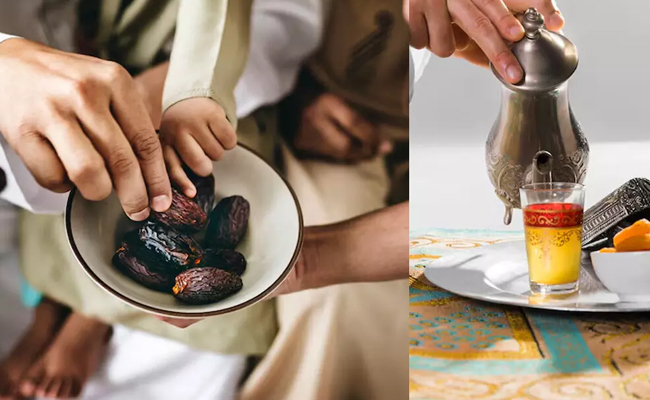Paris: When Spain defeated Egypt on straight sets of beach volleyball at Paris Olympics on Thursday, the debate in social media was not about the performance of the players, it was all about what they wore to the court. Hijab, the attire choice of the Cairo women, was a matter of serious debates across social media platforms, as it was in stark contrast to bikini worn by the Spanish players.
The match was a determining factor for the quarter-finals in the Olympic volleyball tournament. The pictures of the match went viral on the social media and the contrasting attires of the two teams, culturally and geographically distinct, became a topic of hot debate. Egyptian team comprised of Marwa Abdelhady and Doaa Elghobashy, while Fernandez Steiner Liliana and Soria Gutierrez Paula made up the Spanish team. When Spain defeated Egypt in the match, the netizens were all bothered about the players’ attires than the results. Egyptian players, wearing hijabs, long black-sleeved shirts, and black ankle-length leggings found themselves on the wrong end of the stick in the debate.
Commenting on X (formerly Twitter), a user made fun of the contrast as 'Baywatch vs Scuba divers', while another was worried about how hot the Egyptians players would feel in the hijab. Another user said that "Those Egyptian women have got to be at a disadvantage dressed like that". "Spain will be dressing like that in 20 years or sooner", alleged a user who called himself B, James. Many users also pointed out disadvantages on both forms of dresses. Freedom of choice was also highlighted in some comments. Jeannie Doran, another user, wrote that she didn't understand why the women, clad in bikini, are made to expose their buttocks, while the male players wore shorts.
Speaking earlier to the Swedish newspaper Expressen on France’s hijab ban for its athletes in the event, the Egyptian player Marwa Abdelhady had said that she didn’t like it. “I want to play in my hijab, she wants to play in a bikini - everything is okay, if you want to be naked or wear a hijab. Just respect all different cultures and religions”, she stated. Abdelhady said that she didn’t impose her choice of dress on anybody and no one should tell her to wear what she didn’t want to. “No one can tell me how to dress. It's a free country, everyone should be allowed to do what they want”, she added.
Amnesty International was one of the ten groups which opposed the French ban on hijab which it felt would discriminate against Muslim athletes. Anna Blus, the group's women rights researcher, stated that "Banning French athletes from competing with hijabs in the Olympic and Paralympic Games makes a mockery of claims that Paris 2024 is the first gender-neutral Olympics and exposes the racist gender discrimination that underpins access to sport in France".
Helene Ba, co-founder of Basket Pour Toutes (Basketball For All) spoke to BBC about the ban on the eve of Paris Olympics. Her group, which includes mostly young hijab-wearing French Muslim women who love basketball, is fighting against the ban on the Islamic attire in their game and all other sports in the country. She said that the ban had turned people like her into activism. Emphasizing how younger Muslim women in France lost all opportunities because they were unaware of being excluded from the mainstream, Ba said that many stopped playing sport altogether as they didn't have any alternative.
She urged all to speak against the discrimination and infringement on people's rights, when a rule targeted a minority group. She also warned that such discrimination could hit anyone anytime and stressed on the need for mutual support, across groups, in times of need. "We grew up without any role models and we will never have - if these rules stay in place - a French hijabi athlete representing the national team", Ba added.
Let the Truth be known. If you read VB and like VB, please be a VB Supporter and Help us deliver the Truth to one and all.
Judge cites denial of home to Muslim girl, opposition to Dalit women cooking mid-day meals
Hyderabad, February 23, 2026: Supreme Court judge Justice Ujjal Bhuyan has said that despite repeated affirmations of constitutional morality by courts, deep societal faultlines rooted in caste and religious discrimination continue to shape everyday realities in India.
Speaking at a seminar on “Constitutional Morality and the Role of District Judiciary” organised by the Telangana Judges Association and the Telangana State Judicial Academy in Hyderabad, Justice Bhuyan reflected on the gap between constitutional ideals and social practices.
He cited a recent instance involving his daughter’s friend, a PhD scholar at a private university in Noida, who was denied accommodation in South Delhi after her surname revealed her Muslim identity. According to Justice Bhuyan, the landlady bluntly informed her that no accommodation was available once her religious background became known.
In another example from Odisha, he referred to resistance by some parents to the government’s mid-day meal programme because the food was prepared by Dalit women employed as cooks. He noted that some parents had objected aggressively and refused to allow their children to consume meals cooked by members of the Scheduled Caste community.
Describing these incidents as “the tip of the iceberg,” Justice Bhuyan said they reveal how far society remains from the benchmark of constitutional morality even 75 years into the Republic. He observed that while the Constitution lays down standards of equality and dignity, the morality practised within homes and communities often diverges sharply from those values.
He emphasised that constitutional morality requires governance through the rule of law rather than the rule of popular opinion. Referring to the evolution of the doctrine through judicial decisions, he cited Naz Foundation v Union of India, in which the Delhi High Court read down Section 377 of the Indian Penal Code, holding that popular morality cannot restrict fundamental rights under Article 21. Though the judgment was later overturned in Suresh Kumar Koushal v Naz Foundation, the Supreme Court ultimately restored and expanded the principle in Navtej Singh Johar v Union of India, affirming that constitutional morality must prevail over majoritarian views.
“In our constitutional scheme, it is the constitutionality of the issue before the court that is relevant, not the dominant or popular view,” he said.
Justice Bhuyan also addressed the functioning of the district judiciary, underlining that trial courts are the first point of contact for most litigants and form the foundation of the justice delivery system. He stressed that due importance must be given to the recording of evidence and adjudication of bail matters.
Highlighting the role of High Courts, he said their supervisory jurisdiction under Article 227 of the Constitution is intended as a shield to correct grave jurisdictional errors, not as a mechanism to substitute the discretion or factual appreciation of trial judges.
He recalled that several distinguished judges, including Justice H R Khanna, Justice A M Ahmadi, and Justice Fathima Beevi, began their careers in the district judiciary.
On representation within the judicial system, Justice Bhuyan noted that Telangana has made significant strides in gender inclusion. Out of a sanctioned strength of 655 judicial officers in the Telangana Judicial Service, 478 are currently serving, of whom 283 are women, exceeding 50 per cent representation. He added that members of Scheduled Castes, Scheduled Tribes, minority communities, and persons with disabilities are also represented in the state’s judiciary.
He observed that greater representation of women, marginalised communities, persons with disabilities, and sexual minorities would help make the judiciary more inclusive and reflective of India’s diversity. “The judiciary must represent all the colours of the rainbow and become a rainbow institution,” he said.
Justice Bhuyan also referred to the recent restoration by the Supreme Court of the requirement of a minimum three years of practice at the Bar for entry-level judicial posts. While acknowledging that the requirement ensures practical exposure, he cautioned that its impact on women aspirants, especially those from rural or small-town backgrounds facing social and financial constraints, would need to be carefully observed over time.
Concluding his address, he reiterated that the justice system must strive to bridge the gap between constitutional ideals and lived realities, ensuring that the rule of law remains paramount.




